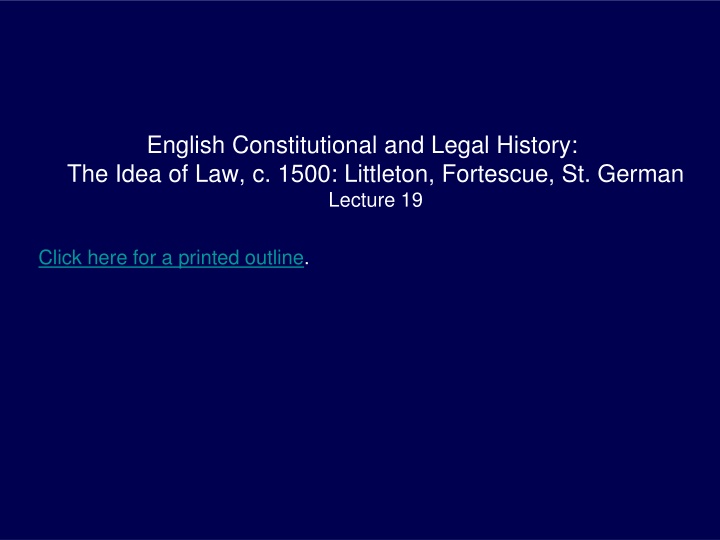English Constitutional and Legal History: The Idea of Law, c. 1500 - Littleton, Fortescue, St. German Lecture 19
The common law faced challenges in the 1500s, with issues in jurisdiction, procedural problems, and an outdated system. Sir Thomas Littleton's scheme of tenures and estates introduced concepts like fee simple, fee tail, curtesy, dower, and more, shaping property law. Explore the evolution of legal principles and structures during this period.
Uploaded on Feb 22, 2025 | 0 Views
Download Presentation

Please find below an Image/Link to download the presentation.
The content on the website is provided AS IS for your information and personal use only. It may not be sold, licensed, or shared on other websites without obtaining consent from the author.If you encounter any issues during the download, it is possible that the publisher has removed the file from their server.
You are allowed to download the files provided on this website for personal or commercial use, subject to the condition that they are used lawfully. All files are the property of their respective owners.
The content on the website is provided AS IS for your information and personal use only. It may not be sold, licensed, or shared on other websites without obtaining consent from the author.
E N D
Presentation Transcript
English Constitutional and Legal History: The Idea of Law, c. 1500: Littleton, Fortescue, St. German Lecture 19 Click here for a printed outline.
Introduction: the common law in trouble Pur avoider le stuffing del rolls ove multip Not intellectually respectable A ce moment monsieur le defendant a jete un brickbat a le justice que narrowly missed Pur avoider le stuffing del rolls ove multiplicity del matter The inns of court as the third university of England The jurisdictional problem: the central royal courts were still notionally courts of limited jurisdiction. Effect on the personal actions generally Effect in particular in the area of contract The increasing irrelevance of the freehold/nonfreehold distinction Procedural problems Cost Reliance on the jury
Introduction: the common law in trouble (contd) Rigidities The magic of the seal Limits on what the sheriff could do Lack of substantive development, particularly in the area of property in land The criminal law was a shocking mess
Sir Thomas Littleton, JCP (d. 1481): Scheme of tenures and estates The fee simple: To A and his heirs Propres ne remontent pas Blood of the first purchaser Exclusion of half-bloods > writ of right Fee tail: To A and the heirs of his body General, special, male, female Gifts in frank marriage No new estates Tenant in tail after possibility of issue extinct
Littleton: Scheme of tenures and estates (contd) Curtesy the right of the husband to a life estate in his wife s lands if she predeceases him. Dower the corresponding right of the wife to a life estate in 1/3 of the husband s lands if he predeceases her By common law or custom Ad ostium ecclesie( at the church door ) Ex assensu patris( with the assent of the father ) De la plus beale (the widow s right to choose among the best of the husband s lands) Tenant for years not a freehold the livery of seisin problem. How is the landlord to convey land that has a tenant for years on it? Tenant at will intentional, remedial Tenant by copy protected in equity in L. s time, not much later by the common-law courts
Littleton: Whats missing from his scheme? Remainders, especially contingent remainders The whole development of uses, particularly remarkable because he used one himself as a will-substitute The development of protection for copyholders, not surprising that L. says nothing about it because it was in equity in L. s time The docking of entails by common recovery, particularly remarkable because he was on the court that decided Taltarum s Case (1472)
Sir John Fortescue, CJKB, c. 13851479 Sir John Fortescue, CJKB, in exile with Henry VI and Prince Edward, 1461 1470, returns with the readeption and dies 1479. De laudibus legum Anglie, On the praise of the laws of England. The notion of dominium politicum et regale an idea similar to limited monarchy. the king of England is not able to change the laws of his kingdom at pleasure, for he rules his people with a government not only regal but also political, Mats., p. IX 11, citing Aristotle and Thomas Aquinas (De regimine principum). The basic argument that power is power only to do good: For, as Boethius said, There is no power unless for good , so that to be able to do evil, as the king reigning regally can more freely do than the king ruling his people politically, diminishes rather than increases his power. Therefore, the king who has the power to do evil has no more power than one who cannot do evil. (Mats., p. IX 12)
Fortescue (contd): various kinds of law Law of nature, customs, statutes: all human laws are either law of nature, customs, or statutes, which are also called constitutions. (Mats., p. IX 12) The antiquity of English customary law: throughout the period of these nations [the Britons, the Romans, the Saxons, the Danes, the Saxons again, and finally the Normans] and their kings, the realm has been continuously ruled by the same customs as it is now, customs which, if they had not been the best, some of those kings would have changed for the sake of justice or by the impulse of caprice, and totally abolished them, especially the Romans, who judged almost the whole of the rest of the world by their laws. (Mats., p. IX 13) Statutes promulgated in parliament: the statutes of England . . . are made not only by the prince s will, but also by the assent of the whole realm, so they cannot be injurious to the people nor fail to secure their advantage. (Mats., p. IX 13)
Fortescue (contd): comparison with the civil law (France) Jurors and witnesses. Naboth s vineyard (1 Kings 21) ). (Mats., p. IX 13) Susanna and the elders (Daniel 13). (Mats., p. IX 13) The case of mr John Fringe, a case that has not been found other than in Fortescue, in which a man, by corrupt witnesses, was able to cast off his orders as a priest and marry a woman whom the witnesses alleged he had married before he was ordained. (Mats., p. IX 14) The use of torture in France: [French] law prefers the accused to be racked with tortures until they themselves confess their guilt, than to proceed by the deposition of witnesses who are often instigated to perjury by wicked passions and sometimes by the subornation of evil persons. Better that 20 guilty should go free than one innocent man die: I should, indeed, prefer twenty guilty men to escape death through mercy, than one innocent to be condemned unjustly. (Mats., p. IX 15)
Fortescue (contd): comparison with France (contd) The effects of the civil law on the poverty of France and the richness of England: You remember, most admirable prince, you have seen how rich in fruits are the villages and towns of the kingdom of France, whilst you were travelling there, but so burdened by the men-at-arms, and their horses, of the king of that land, that you could be entertained in scarcely any of them except the great towns. . . . [In England] every inhabitant of that realm uses at his own pleasure the fruits which his land yields, the increase of his flock, and all the emoluments which he gains, whether by his own industry or that of others, from land and sea, hindered by the injuries and rapine of none without obtaining at least due amends. (Mats., p. IX 16, IX 17)
Fortescue (contd): conclusion Concludes that Thomas Aquinas concludes that it were best that all men be ruled politically. The passage is too long to read here, but it is well worth reading carefully. Aquinas might not have disagreed with what is said here, it is not quite what Aquinas says. (Mats., p. IX 18) Fortescue s contribution to political thought is his notion of limited monarchy, a dominium politicum et regale. This is preferable because men are weak and the king may become a tyrant; therefore, he must be restrained by law. At times he seems to be saying that this law is simply natural law or moral law, and in this sense he is no different from Aquinas, but 200 years of parliaments have added a different idea: the notion that the king is bound by what is done in Parliament. He is also prepared to say or at least to suggest that the king cannot change the customs of the realm, except perhaps in parliament. (cont d on next slide)
Fortescue (contd): conclusion (contd) The idea of legislative power is coming to be defined in England, though we still need the Reformation Parliament to break down the idea that parliament is simply doing what has been done in the past, and even the Reformation Parliament so pretended. Fortescue s encomium on the English jury is not yet, but can become, a 17th century discourse on the rights of Englishmen and the blessings of ordered liberty. And the notion has developed that we should judge the law not only by its antiquity but also by its results. See the comparison of France vs. England. As a piece of result-oriented or teleological legal reasoning this one is not very good. The reason for the difference between the wealth of England and that of France in Fortescue s period was almost certainly not the result of the difference in legal systems. What we lack yet is any guide to what can be changed and what can t. That will take another 200 years to work out, but the beginnings are there.
Christopher St. German, c. 14601540: Doctor and Student Two dialogues, published 1525 and 1530. The Doctor in the dialogue represents morality, the Student, the law. Sinderesis, the innate drive in men to do good and avoid evil. Divine law revealed by God and natural law discovered by reason. Conscience is the application of moral rules to specific case and in this definition conscience is hard to distinguish from equity, though the latter looks more to the judge while conscience looks more to the individual. Equity is right wiseness that considereth all the pertinent circumstances of the deed, the which is also tempered with mercy. (I.16, p. IX 22).
St. German, Doctor and Student: equity Notion that equity is also inherent in the common law (I.17, p. IX 23, the example derived from Littleton is that an infant is not deprived of a right of entry by descent cast). Equity of a statute (id., example is the exception read into the waste statute that it does not cover the infant tenant who suffers waste). Chancery example (p. I.12, pp. IX 19, the classic example of the debt on an obligation to which no sealed acquittance has been obtained). Limits on Chancery in appeals (I.18, p. IX 25, the statute of 4 H. 4, c. 22, which prohibits examination of a judgment given in the king s courts in chancery, parliament or elsewhere). Notion of conscience ordered after law (many examples, e.g., I.20, p. IX 27 to IX 28, common-law inheritance, borough English inheritance, and gavelkind inheritance). What is the principle?
St. German, Doctor and Student: equity and law in conflict A formal conveyance (fine) in court binds even those who were not parties to it after 5 years in both law and conscience (I.25, p. IX 33). But an acquittance not under seal will bind the parties in equity but not in law. In both cases we look to the purpose of the law and in both cases we discover that the purpose is to provide stability to transactions. In one case equity will intervene; in the other it won t. Why? The five-year limitation on fines is made by statute, that requiring a sealed acquittance is a matter of common law, but St. G. makes nothing of this distinction. A bequest of English land is void and not binding in conscience (I.20, p. IX 28). A bequest of a use is equally void at law, but the feofees will be compelled in equity to execute it (II.22, pp. IX 33 to IX 36). The testator s purpose in both cases is the same, and the argument given for the use, that the law doesn t prohibit it just makes it void (p. IX 34), is equally applicable to a straight bequest.
St. German, Doctor and Student: equity and law in conflict (cont d) These dilemmas, but not all of the similar ones that St. G. proposes, can be resolved by looking to the defendant. The conveyee in the fine has no relationship to the stranger who seeks to upset it nor has the heir at law of the testator who bequeaths English land agreed to the bequest. By contrast both the creditor who gave the unsealed acquittance and the feoffee to uses have made agreements which it would be unconscionable to allow them to break. The law is no respecter of persons; equity operates in personam. This may be as close as we can come to resolving dilemmas that St. German does not face.
St. German, Doctor and Student: conclusion (for now) Ultimately, we will end up with a legal system in which certain matters proceed in the common-law courts and certain matters in the court of Chancery. The fact, however, that St. German, who was a pretty good theorist, could not find a principle that separated the two should make us hesitant to assume that there was such a principle, or indeed that we can come up with such a principle. Certainly the U.S. Supreme Court has not come up with any such principle as it seeks to determine what are cases at law in which there is a constitutional right to a jury trial. The converse of that proposition is that there is no constitutional right to a jury trial in cases in equity. Determination of where that line lay in 1790 has allowed legal historians to make some money by providing expert testimony, but it has not produced much in the way of enlightenment.























